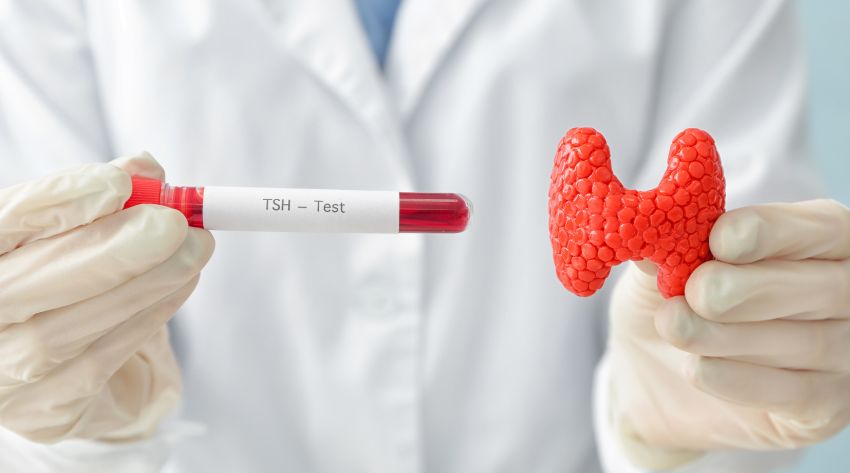If you’ve been feeling wired but tired, sweating more than usual, or finding your heart pumping faster than normal—especially as the summer heat kicks in—you’re not imagining things. Hyperthyroidism, or an overactive thyroid (also called overactive thyroid), can become even more challenging to manage during the summer months. Your body’s thermostat is already turned on high, and when that combines with external heat and possibly humidity, it can feel like your symptoms are in overdrive. This condition is more common in women and individuals over the age of 60, making it essential to recognize and address symptoms early. Common hyperthyroidism symptoms include increased heart rate, anxiety, and heat intolerance, but other symptoms may also develop, especially in different age groups.
Let’s break down what’s going on with your thyroid, what to look out for, and how to mitigate these symptoms in your body naturally so you can enjoy the summer without burning up—literally. Some people may develop symptoms suddenly or more gradually, and other symptoms beyond those listed can occur.
What is Hyperthyroidism and How Does it Affect the Thyroid Gland?
Hyperthyroidism, less common than hypothyroidism, is a condition where the thyroid gland becomes overactive and produces more thyroid hormones than needed—primarily thyroxine (T4), the inactive thyroid hormone, and triiodothyronine (T3), the active thyroid hormone. This is how excess thyroid hormone occurs in the body.

The thyroid gland is a small butterfly shaped gland, located in the front of the neck. The thyroid gland produces and makes hormones that regulate energy use, growth, and many bodily functions. These hormones affect your body’s metabolism, temperature regulation, heart rate, and energy production, as well as digestion, brain function, libido, and gut motility. When the thyroid is in overdrive, everything “speeds up”, just like when the thyroid is sluggish, everything slows down.
Who Can Develop Hyperthyroidism?
Hyperthyroidism can affect people of all ages, but certain groups are more likely to develop this thyroid disease. According to the American Thyroid Association, women are significantly more at risk—being 2 to 10 times more likely to experience an overactive thyroid than men. The risk also increases with age, especially for those over 60.
Family history plays a big role as well. If you have relatives with thyroid disease, particularly Graves’ disease, your chances of developing hyperthyroidism are higher.
Autoimmune conditions like type 1 diabetes or rheumatoid arthritis can also increase your risk, since these conditions can trigger the immune system to mistakenly attack the thyroid gland.
Other factors include the presence of thyroid nodules or toxic multinodular goiter, both of which can cause the thyroid gland to produce too much thyroid hormone.
Pregnant women, or those who have recently given birth, may also be at increased risk due to hormonal changes that can affect thyroid function. Additionally, people who have undergone thyroid surgery or received radioactive iodine treatment for other thyroid conditions may be more likely to develop hyperthyroidism later on.
Understanding your personal risk factors can help you and your healthcare provider stay proactive about monitoring thyroid health, especially if you fall into one of these higher-risk categories.
Common Causes of Excess Thyroid Hormone (Hyperthyroidism)
There are several reasons your thyroid may become overactive:
Graves’ Disease – This is the most common autoimmune cause where the immune system accidentally attacks the thyroid, triggering it to become overactive. Graves’ disease is an autoimmune disease, autoimmune disorder, and autoimmune condition that stimulates the thyroid to produce excess hormones by targeting thyroid cells.
Thyroid nodules – Nodules are benign lumps that start producing excess hormones. Overactive thyroid cells within these nodules can lead to excess hormone production.
Toxic goiter – This refers to an enlarged, overactive thyroid gland (goiter) that produces excessive hormones. Toxic goiter is a subtype of hyperthyroidism where the gland’s hyperfunction leads to thyrotoxicosis.
Subclinical hyperthyroidism – This is a milder form of hyperthyroidism characterized by low TSH levels with normal T4 and T3. It may increase the risk of cardiovascular and bone complications and is sometimes detected during routine screening.
Thyroid cancer – While rare, thyroid cancer can sometimes present with hyperthyroidism, especially if cancerous thyroid cells are overactive.
Iodine Deficiency– Without enough iodine, the thyroid works harder to compensate and can cause the thyroid to become overactive. As the gland enlarges to trap more iodine, it may start producing excess hormones on its own, not listening to the brain signals.
Inflammation of the thyroid (thyroiditis) – Inflammation in the thyroid is often triggered post-infection or postpartum. This can trigger hypothyroidism or hyperthyroidism. Inflammation can also stimulate the hypothalamic-pituitary-thyroid axis, leading to excessive thyroid hormone production in some people.
Overmedication with thyroid hormones – This is common in those treated for hypothyroidism. The thyroid becomes overstimulated with too much medication, leading to hyperthyroidism
.Modern toxins- Modern-day toxin exposure including halogens (fluoride, bromide, chlorine), heavy metals and radiation can trigger both hypothyroidism and hyperthyroidism
.Stress– Stress affects the body in multiple ways, and can trigger both hypothyroidism and hyperthyroidism
.Gut Imbalances– A leaky Gut is where the gut lining becomes permeable, autoimmunity can be triggered and lead to Graves’ disease. A damaged gut can lead to a loss of immunity, promoting the development of antibodies that stimulate the thyroid.
Lack of Nutrients– Minerals like iodine, selenium, and zinc can interrupt the body’s feedback loops, triggering hormone production dysfunction.
Estrogen Imbalance– Excess estrogen can disrupt thyroid hormone binding in the bloodstream. This can lead to hypothyroidism and hyperthyroidism.
People with digestive and kidney diseases, or kidney diseases alone, may have additional risk factors or complications related to hyperthyroidism.
How is Hyperthyroidism Diagnosed?

Diagnosing hyperthyroidism is a step-by-step process that combines a thorough physical exam, detailed blood tests, and sometimes advanced imaging tests. Your healthcare provider will start by checking for classic signs of an overactive thyroid, such as an enlarged thyroid gland, rapid heartbeat, and unexplained weight loss. They’ll also review your medical history to see if you have any risk factors, like previous thyroid surgery or radioactive iodine treatment.
The next step is usually a series of blood tests to measure your thyroid hormone levels. These tests look at the amount of thyroid stimulating hormone (TSH) produced by the pituitary gland, as well as the levels of thyroxine (T4) and triiodothyronine (T3) made by the thyroid gland. In hyperthyroidism, blood tests typically show high levels of T3 and T4, and a low level of TSH, since the pituitary gland tries to slow down the overactive thyroid.
If your blood tests suggest hyperthyroidism, your doctor may recommend imaging tests for a closer look. A thyroid ultrasound can help identify an enlarged thyroid gland, thyroid nodules, or other structural changes. A radioactive iodine uptake test or thyroid scan may be used to see how much iodine your thyroid gland absorbs and to pinpoint the cause of the excess thyroid hormone production.
Why ‘Normal’ Thyroid Labs Don’t Mean You’re Thriving
Most standard thyroid tests only check TSH, which is a signal from the brain—not an actual measure of how well your thyroid is functioning. You can have “normal” TSH but still feel exhausted, gain weight, or experience brain fog if your body isn’t converting thyroid hormones properly. That’s why it’s so important to go beyond the basics.
A comprehensive thyroid panel should include Free T4, Free T3, Reverse T3, and thyroid antibodies (TPO and Tg). These give a fuller picture—revealing if your active hormone levels are low, if your body is under stress and producing too much Reverse T3, or if your immune system is attacking your thyroid. Without this deeper insight, many people are misdiagnosed or left untreated for years.
Why Summer Can Make Hyperthyroidism Worse
People with hyperthyroidism often struggle in the heat. That’s because their metabolism is already revved up, generating more internal heat than the average person. When external temperatures rise, it becomes harder for the body to maintain thermal balance. Symptoms such as weight loss, anxiety, irritability, and heat intolerance are common in individuals with this condition. Other symptoms, such as subtle mood changes or digestive issues, may also become more noticeable during hot weather.

Here’s how summer can affect someone with hyperthyroidism:
Increased Sweating – The body attempts to cool down an already overheated system.
Heart Palpitations – Palpitations become more pronounced due to dehydration and electrolyte loss.
Fatigue – The body exhausts itself trying to stay regulated.
Irritability & Anxiety – Driven by excess cortisol and overstimulated adrenals.
Sleep Disturbances – Difficulty falling or staying asleep, especially in hot, humid weather.
Signs of an Overactive Thyroid (Especially in Summer)
If you’re not sure whether your symptoms are summer-related or thyroid-driven, here are common signs to watch for:
Rapid or irregular heartbeat
Nervousness or restlessness
Sweating more than usual
Heat intolerance
Unexplained weight loss
Frequent bowel movements or loose stools
Sleep issues, particularly waking early
Muscle weakness or tremors
Menstrual irregularities or fertility issues, including lighter periods and less frequent menstruation
Now let’s talk about what you can do to feel better—naturally.
Lifestyle Factors that Impact Hyperthyroidism
Sleep
An overactive thyroid can give you that “wired but tired” feeling, making it difficult to fall asleep and wind down. To create a calm bedtime routine, avoid screens at least 2 hours before bed, take a short walk at sundown to lower cortisol and set your circadian rhythm, dim the lights, and eat your last meal at least 3 hours before bed.
Eat Regular Meals and Prioritizing Wild Animal Protein
Hyperthyroidism speeds up the metabolism and your body may burn through the nutrients quickly. It is important to not skip meals and focus on wild animal protein as it will help stabilize blood sugar and provide the most nutrient-dense food available. Pairing the wild animal protein with healthy fats like organic olive oil, butter, ghee, coconut oil, and organic avocado oil and with organic fruits, vegetables, and complex carbs listed in the Accelerated Food Guide, will help stabilize blood sugar and energy.
Avoid Stimulants and Processed Foods
Avoiding processed foods, sugar, and caffeine is helpful, as all three will only exacerbate symptoms of hyperthyroidism. These substances can leave you more anxious, jittery, and depleted of energy.
Exercise, But Not Too Much
Exercise is imperative but only focus on strength training, and calm activities like yoga, walks, and swims. High-intensity or chronic cardio will spike cortisol and make symptoms worse. These more gentle activities will support your mood, detox, and cortisol levels without overtaxing your system.
Manage Stress
Anxiety, racing thoughts, and irritability are common with hyperthyroidism. Daily practices like breath work, meditation, prayer, and journaling can calm the vagus nerve and reset your stress response and your thyroid health.
Bonus Tips to Stay Cool, Calm & Balanced During Summer
Along with supplementation, here are simple strategies to help you feel more stable:
Hydrate with electrolytes – I recommend Accelerated Ancient Salt® in your water to support adrenal balance, detoxification, and proper hydration.
Cut back on stimulants – Caffeine can worsen cortisol dysregulation. Try herbal teas or clean hydrating alternatives like herbal electrolytes.
Cool down naturally – Magnesium baths, cold compresses on the neck, and grounding your bare feet outside in the grass can lower body temperature and calm the nervous system.
Prioritize sleep hygiene – Use blackout curtains, keep the room cool, and avoid blue light in the evenings.
Prioritize wild animal protein- These proteins are not only the most nutrient-dense foods on the planet giving your thyroid the raw materials for optimal function, but they also provide the building blocks for muscles, hair, tissues, and organs including the thyroid.
Dietary Supplement Support for Hyperthyroidism During Summer
The body is always working hard to restore balance. But it needs the right tools—and with hyperthyroidism, that means nourishing the thyroid, calming the nervous system, and detoxifying the body. The following dietary supplements can provide life changing support for hyperthyroidism during the summer months (and all year round).
Iodine – The Foundation for Thyroid Balance
Most people assume that iodine is only for hypothyroidism—but here’s the truth: the thyroid cannot function correctly without iodine. Even in hyperthyroidism, iodine deficiency is often at the root of the imbalance. Sufficient iodine will keep the thyroid from being in a stressed state as a result of this essential mineral for the thyroid hormones T4 and T3 (4 and 3 stand for 4 and 3 molecules of iodine). Anytime the body is missing nutrients, a level of stress enters the body, initially ramping up its functions like heart rate, metabolism, and more.
Acceleradine® Iodine provides iodine in its purest, most bioavailable form: single-atom iodine in 200-proof organic alcohol, scalar-enhanced for deep cellular absorption.
99% of hyperthyroid sufferers have found that replenishing iodine in a controlled, cellular way with iodine helps reduce symptoms like nervousness, temperature swings, and sleep disruptions.
Accelerated Thyroid® – Nourish, Don’t Stimulate
You might think thyroid supplements are only for low thyroid, but Accelerated Thyroid® is different. It doesn’t just stimulate the gland—it supports and nourishes the entire endocrine system.
This comprehensive formula includes:
Freeze-dried thyroid glandular – to support natural hormone levels.
L-tyrosine & L-threonine – to assist in hormone balance and neurotransmitter production.
Kanchanar Guggulu – an Ayurvedic herb known to detoxify and balance the thyroid.
Adaptogens – to support the adrenals and stabilize the stress response.
During summer, many hyperthyroid individuals deal with cortisol imbalances that worsen insomnia and heat intolerance. This formula supports a more even energy flow, helping reduce the “wired but tired” sensation and calming the overactive metabolism without suppressing it artificially.
Accelerated Ancient Salt® - The Healthy Salt
With hyperthyroidism, the metabolism is revving too high and the body is burning through minerals and electrolytes at an accelerated rate that can cause you to feel wired, depleted, and prone to muscle weakness, heart palpitations, and blood pressure swings. Furthermore, hyperthyroidism taxes the adrenals, and when the adrenals are in overdrive they utilize iodine and salt at a much higher rate. Without sufficient salt, the adrenals struggle to maintain proper electrolyte levels and keep energy levels up; salt helps reduce the physiological burden of stress.
Salt works synergistically with iodine to support the thyroid directly; without enough unrefined salt, iodine cannot be transported effectively into the cells. Salt helps deliver the iodine across the cell membranes where it’s needed for hormone production.
Hyperthyroidism hits the brain too; thoughts are racing and you can’t relax regardless of how tired you are. The trace minerals in Accelerated Ancient Salt® are critical for nerve transmission and cognition.
Accelerated Liver Care® – Restore the Conversion Pathway
The liver plays a key role in thyroid hormone balance. It converts T4 into the active T3 hormone and helps eliminate excess hormones and toxins that can disrupt the thyroid-adrenal axis.
Accelerated Liver Care® is packed with targeted ingredients like:
TUDCA – This helps increase bile flow which moves the excess toxins out of the body efficiently which supports healthy thyroid function.
Milk Thistle & Phyllanthus – Known for their antioxidant properties, these ingredients protect the cells from damage and support the regeneration of liver tissue. Without a healthy liver, the body cannot metabolize and clear out excess thyroid hormones.
Pau Pereira– Known for its antiviral, and antiinflammatory properties, this rare South American herb helps mitigate cirrhosis, supporting the immune system, and modulating autoimmunity connected to hyperthyroidism
.Calcium D-Glucarate & Skullcap – These two help eliminate estrogen dominance by gently eliminating excess hormones out of the body and reducing cortisol spikes. They reduce overall systemic inflammation, supporting the whole endocrine system.
The combination of 13 specific herbs that are designed to work synergistically to detox, restore, and rebuild the liver helps overall, immunity, detoxification, metabolism, and proper energy – all things that affect hyperthyroidism.
In summer, the added heat, dehydration, and exposure to chemicals (sunscreens, chlorinated pools, pesticides) place extra pressure on the liver. Supporting it daily with Accelerated Liver Care® helps prevent hormone recycling and reduces the inflammatory burden that fuels hyperthyroid symptoms.
Wrapping It All Up
Hyperthyroidism happens when the thyroid gland goes into overdrive, producing more hormones than your body needs. This can create a ripple effect of symptoms and, if left unchecked, lead to some serious health issues. Untreated hyperthyroidism can result in severe complications, including thyroid storm—a life-threatening emergency—and long-term risks such as osteoporosis.
The good news? With the right information and support, you can take charge of your thyroid health. Understanding the root causes, recognizing the symptoms, and exploring your treatment options are powerful steps toward healing.
Remember, you’re not alone in this. With the right care and a little education, you can feel like yourself again and live a vibrant, healthy life.
Hyperthyroidism happens when the thyroid gland goes into overdrive, producing more hormones than your body needs. This can create a ripple effect of symptoms and, if left unchecked, lead to some serious health issues. Untreated hyperthyroidism can result in severe complications, including thyroid storm—a life-threatening emergency—and long-term risks such as osteoporosis.
The good news? With the right information and support, you can take charge of your thyroid health. Understanding the root causes, recognizing the symptoms, and exploring your treatment options are powerful steps toward healing.
Remember, you’re not alone in this. With the right care and a little education, you can feel like yourself again and live a vibrant, healthy life.
Sara Banta
Sara Banta is a Stanford University Graduate with a Degree in Economics and Psychology, and a certified Natural Supplement Expert & Graduate of the Institute for Integrative Nutrition. Sara is the Founder of Accelerated Health Products and host of the health & wellness podcast, Accelerated Health Radio.
- Sara Banta
- Sara Banta
- Sara Banta
- Sara Banta
- Sara Banta
- Sara Banta
- Sara Banta
- Sara Banta
- Sara Banta
- Sara Banta
- Sara Banta
- Sara Banta
- Sara Banta
- Sara Banta
- Sara Banta
- Sara Banta
- Sara Banta
- Sara Banta
- Sara Banta
- Sara Banta
- Sara Banta
- Sara Banta
- Sara Banta
- Sara Banta
- Sara Banta
- Sara Banta
- Sara Banta
- Sara Banta
- Sara Banta
- Sara Banta
- Sara Banta
- Sara Banta
- Sara Banta
- Sara Banta
- Sara Banta
- Sara Banta
- Sara Banta
- Sara Banta
- Sara Banta
- Sara Banta
- Sara Banta
- Sara Banta
- Sara Banta
- Sara Banta
- Sara Banta
- Sara Banta
- Sara Banta
- Sara Banta
- Sara Banta
- Sara Banta
- Sara Banta
- Sara Banta
- Sara Banta
- Sara Banta
- Sara Banta
- Sara Banta
- Sara Banta
- Sara Banta
- Sara Banta
- Sara Banta
- Sara Banta
- Sara Banta
- Sara Banta
- Sara Banta
- Sara Banta
- Sara Banta
- Sara Banta
- Sara Banta
- Sara Banta
- Sara Banta
- Sara Banta
- Sara Banta
- Sara Banta
- Sara Banta
- Sara Banta
- Sara Banta
- Sara Banta
- Sara Banta
- Sara Banta
- Sara Banta
- Sara Banta
- Sara Banta
- Sara Banta
- Sara Banta
- Sara Banta
- Sara Banta
- Sara Banta
- Sara Banta
- Sara Banta
- Sara Banta
- Sara Banta
- Sara Banta
- Sara Banta
- Sara Banta
- Sara Banta
- Sara Banta
- Sara Banta
- Sara Banta
- Sara Banta
- Sara Banta
- Sara Banta
- Sara Banta
- Sara Banta
- Sara Banta
- Sara Banta
- Sara Banta
- Sara Banta
- Sara Banta
- Sara Banta
- Sara Banta
- Sara Banta
- Sara Banta
- Sara Banta
- Sara Banta
- Sara Banta
- Sara Banta
- Sara Banta
- Sara Banta
- Sara Banta
- Sara Banta
- Sara Banta
- Sara Banta
- Sara Banta
- Sara Banta
- Sara Banta
- Sara Banta
- Sara Banta
- Sara Banta
- Sara Banta
- Sara Banta
- Sara Banta
- Sara Banta
- Sara Banta
- Sara Banta
- Sara Banta
- Sara Banta
- Sara Banta
- Sara Banta
- Sara Banta
- Sara Banta
- Sara Banta
- Sara Banta
- Sara Banta
- Sara Banta
- Sara Banta
- Sara Banta
- Sara Banta
- Sara Banta
- Sara Banta
- Sara Banta
- Sara Banta
- Sara Banta
- Sara Banta
- Sara Banta
- Sara Banta
- Sara Banta
- Sara Banta
- Sara Banta
- Sara Banta
- Sara Banta
- Sara Banta
- Sara Banta
- Sara Banta
- Sara Banta
- Sara Banta
- Sara Banta
- Sara Banta
- Sara Banta
- Sara Banta
- Sara Banta
- Sara Banta
- Sara Banta
- Sara Banta
- Sara Banta
- Sara Banta
- Sara Banta
- Sara Banta
- Sara Banta
- Sara Banta
- Sara Banta
- Sara Banta
- Sara Banta
- Sara Banta
- Sara Banta
- Sara Banta
- Sara Banta
- Sara Banta
- Sara Banta
- Sara Banta
- Sara Banta
- Sara Banta
- Sara Banta
- Sara Banta
- Sara Banta
- Sara Banta
- Sara Banta
- Sara Banta
- Sara Banta
- Sara Banta
- Sara Banta
- Sara Banta
- Sara Banta
- Sara Banta
- Sara Banta
- Sara Banta
- Sara Banta
- Sara Banta
- Sara Banta
- Sara Banta
- Sara Banta
- Sara Banta
- Sara Banta
- Sara Banta
- Sara Banta
- Sara Banta
- Sara Banta
- Sara Banta
- Sara Banta
- Sara Banta









